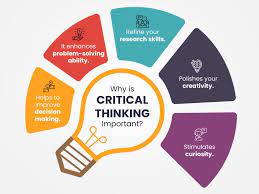The Importance of Developing Critical Thinking Skills
Critical thinking is a valuable skill that plays a crucial role in our everyday lives. It involves the ability to analyse, evaluate, and interpret information effectively to make informed decisions. Developing critical thinking skills is essential for personal growth, academic success, and professional advancement.
Enhancing Problem-Solving Abilities
Individuals with strong critical thinking skills are better equipped to identify and solve complex problems. They can approach challenges from different perspectives, consider various solutions, and make well-reasoned decisions based on evidence rather than emotions or biases.
Promoting Independent Thinking
By developing critical thinking skills, individuals learn to question assumptions, challenge conventional wisdom, and think independently. They become more adept at distinguishing between fact and opinion, recognising logical fallacies, and forming their own opinions based on sound reasoning.
Fostering Effective Communication
Effective communication is closely linked to critical thinking. Individuals who can think critically are better communicators as they can articulate their thoughts clearly, present arguments persuasively, and engage in constructive dialogue with others. They are also more likely to listen actively and consider alternative viewpoints.
Empowering Lifelong Learning
Critical thinking is a lifelong skill that empowers individuals to continue learning and adapting in an ever-changing world. By honing their critical thinking abilities, individuals can navigate complex issues, acquire new knowledge efficiently, and stay intellectually curious throughout their lives.
Cultivating Analytical Skills
Analytical skills are fundamental to critical thinking. Individuals who develop strong critical thinking skills also enhance their ability to analyse information rigorously, draw logical conclusions, and assess the validity of arguments. These analytical skills are valuable in various contexts, from academic research to problem-solving in the workplace.
Conclusion
Developing critical thinking skills is a transformative journey that equips individuals with the tools they need to thrive in a complex world. By honing their ability to think critically, individuals can enhance their problem-solving abilities, promote independent thinking, foster effective communication, empower lifelong learning, and cultivate analytical skills. Investing in the development of critical thinking skills is an investment in personal growth and success.
Six Key Strategies to Enhance Your Critical Thinking Skills
- Question assumptions and look for evidence to support them
- Consider different perspectives and viewpoints on a topic
- Evaluate the credibility and reliability of sources of information
- Practice active listening and ask clarifying questions
- Engage in discussions and debates to challenge your own beliefs
- Reflect on your own thought processes and reasoning
Question assumptions and look for evidence to support them
In the pursuit of developing critical thinking skills, it is crucial to question assumptions and seek evidence to substantiate them. By challenging preconceived notions and actively seeking out supporting evidence, individuals can cultivate a mindset that values logical reasoning and sound judgment. This practice not only encourages a deeper understanding of complex issues but also fosters a habit of approaching information with a discerning eye, ultimately leading to more informed decision-making and enriched perspectives.
Consider different perspectives and viewpoints on a topic
When aiming to enhance critical thinking skills, it is essential to consider different perspectives and viewpoints on a given topic. By exploring diverse angles and opinions, individuals can broaden their understanding, challenge their assumptions, and develop a more comprehensive analysis of the subject at hand. Embracing various viewpoints not only fosters open-mindedness but also encourages critical evaluation and the ability to weigh conflicting ideas thoughtfully. This practice ultimately leads to more informed decision-making and a deeper appreciation for the complexity of issues.
Evaluate the credibility and reliability of sources of information
In the quest to develop critical thinking skills, a crucial tip is to always evaluate the credibility and reliability of sources of information. By scrutinising the trustworthiness and authority of sources, individuals can discern between accurate, well-researched information and potentially misleading or biased content. This practice not only enhances one’s ability to make informed decisions but also cultivates a habit of seeking out reliable sources to support arguments and conclusions effectively. By prioritising credibility in information evaluation, individuals can navigate the vast sea of data with confidence and clarity.
Practice active listening and ask clarifying questions
An effective tip for developing critical thinking is to practice active listening and ask clarifying questions. By actively listening to others during discussions or debates, you can gain a deeper understanding of different perspectives and arguments. Asking clarifying questions not only demonstrates your engagement but also helps uncover underlying assumptions and reasoning behind the information presented. This approach encourages critical thinking by prompting you to evaluate the validity of statements, consider alternative viewpoints, and refine your own arguments based on a comprehensive understanding of the topic at hand.
Engage in discussions and debates to challenge your own beliefs
Engaging in discussions and debates is a powerful tip for developing critical thinking skills as it encourages individuals to challenge their own beliefs and opinions. By actively participating in conversations that involve differing viewpoints, individuals are prompted to re-evaluate their perspectives, consider alternative arguments, and assess the validity of their own ideas. This process of intellectual engagement not only sharpens one’s analytical abilities but also fosters open-mindedness and a willingness to explore new concepts, ultimately leading to enhanced critical thinking capabilities.
Reflect on your own thought processes and reasoning
Reflecting on your own thought processes and reasoning is a powerful tip for developing critical thinking skills. By taking the time to introspect and analyse how you approach problems and make decisions, you can identify any biases, assumptions, or logical errors that may be influencing your thinking. This self-awareness allows you to refine your reasoning, challenge preconceived notions, and develop a more objective and rational approach to problem-solving. Through reflection, you can enhance your critical thinking abilities and become a more effective and insightful thinker in various aspects of your life.

